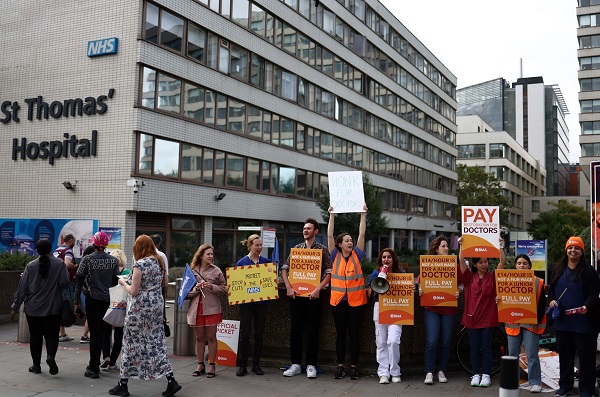A fresh wave of discontent swept through England's healthcare system as hospital doctors commenced a four-day walkout, demanding a significant 35 percent pay increase.
However, this strike has raised concerns, with the government arguing that it "serves only to harm patients."
The ongoing industrial action has not only strained patient care but also imposed a substantial financial burden on the publicly funded health service, estimated to have incurred a staggering cost of £1 billion ($1.2 billion).
A pivotal demographic within the UK's hospitals, junior doctors, who represent around half of the physician workforce, embarked on their fifth round of strikes, initiating the walkout at 7:00 am (0600 GMT) and scheduling it to conclude at 7:00 am on Tuesday.
Health Secretary Steve Barclay expressed his firm disapproval of the doctors' actions, particularly those who have rejected the government's proposed pay increase of six percent along with a one-off payment of £1,250. In an op-ed for the Daily Mail, he criticized the British Medical Association (BMA), the representative body for junior doctors, accusing them of acting recklessly.
Barclay emphasized that the strike's repercussions were detrimental to patients and exacerbated the strain on medical staff.
However, on the picket lines outside central London hospitals, doctors claimed that they felt compelled to strike due to the government's refusal to engage in negotiations.
Junior doctor Sumi Manirajan asserted, "Doctors are working tirelessly to bring waiting lists down. The government are the ones who refuse to come to the table." Manirajan, also the deputy co-chair of the BMA's junior doctor committee, highlighted the dire staffing situation and the strain it has placed on the healthcare workforce.
The healthcare sector, grappling with an unprecedented pandemic backlog, is witnessing record patient waiting times. The NHS reported that in June alone, a record 7.6 million people in England were awaiting routine hospital treatment.
According to Julian Hartley, chief executive of NHS Providers, the series of strikes led by junior doctors has inflicted a monumental financial toll, amounting to £1 billion ($1.2 billion) due to hospitals having to pay "premium rates to consultants" to cover for the striking doctors. This exacerbates the already precarious financial state of the NHS.
While the BMA argues that junior doctors have experienced a 26 percent drop in take-home pay over the last 15 years, the government contends that their demands are economically unsustainable.
The broader healthcare workforce, including nurses and ambulance staff, has also joined picket lines, intensifying the pressure on the NHS.
Throughout the economy, various workers have resorted to strikes over the past year, seeking salary increases in response to a generation-defining cost of living crisis.
Since December, approximately 778,000 medical appointments across the NHS have been postponed due to strike actions, according to NHS figures. Health Secretary Barclay emphasized that such disruptions are counterproductive and reiterated that the government's pay offer, declared in mid-July, is more generous compared to offers for other public sector staff.
Despite the government's declaration that the pay offer is final, the BMA has been urged to drop their pay demands "immediately."









